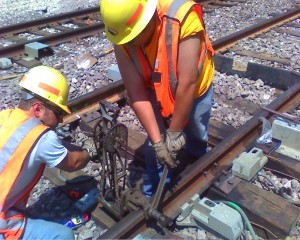 A short quiz for you. If you had anything to do with the safe movement of a 10,000 ton freight train, does it make sense for you to routinely show up to work tired? Hint: NO.
A short quiz for you. If you had anything to do with the safe movement of a 10,000 ton freight train, does it make sense for you to routinely show up to work tired? Hint: NO.
That’s the problem we have today in the freight rail industry. Too many tired employees are involved in operating trains and maintaining electric signal systems. But there are solutions: curb the unpredictable work schedules and hours worked and end the practice of gaming the rules on how railroads “count” the hours worked by their signal employees.
So here’s a quick glimpse into the tired lives of members of the two TTD affiliates that are leading the charge for common sense reforms – the SMART Transportation Division and the Brotherhood of Railroad Signalmen.
Although current rules limit a work shift to 12 hours and mandate 10 hours of undisturbed rest after a shift, the boss can call an employee to work at any time after that 10-hour period of rest with two hours’ or less notice. Here’s a real world example. You are a rail worker, and you have just spent the day on yard work. You finally get cleaned up, sit down to eat a hot meal, start thinking about a nap when the phone rings and you find you have less than two hours to prepare yourself for a full shift. Sound fair?
Congress and the Obama Administration need to change what are referred to as “hours-of-service” laws by moving the required 10 hours of undisturbed rest from immediately after service to immediately before service. Effectively, these workers should be given 10 hours’ notice before being expected to report for work. This gives them the predictability they need to get the appropriate amount of rest before their shift starts rather than after they leave work. Or, as an alternative, they should be assigned predictable work schedules. Neither happens today.
Signal employees face a different problem with the same outcome. At issue are definitions of “covered work.” For example, when a signalman on duty is digging a ditch in order to install a railroad signal, the time spent digging the ditch does not count toward the hours-of-service limit. Only certain work is counted. Huh? Yes, somehow in the freight rail industry digging a ditch for a signal system installation is not considered work and apparently doesn’t lead to any fatigue. This must change too.
The freight rail industry is a place where men and women can secure middle-class careers. But too often their working lives are spent in a state of chronic fatigue. If our government closes the regulatory loopholes and stops employers from using technicalities to evade or game the rules, we will have a safer freight rail industry.